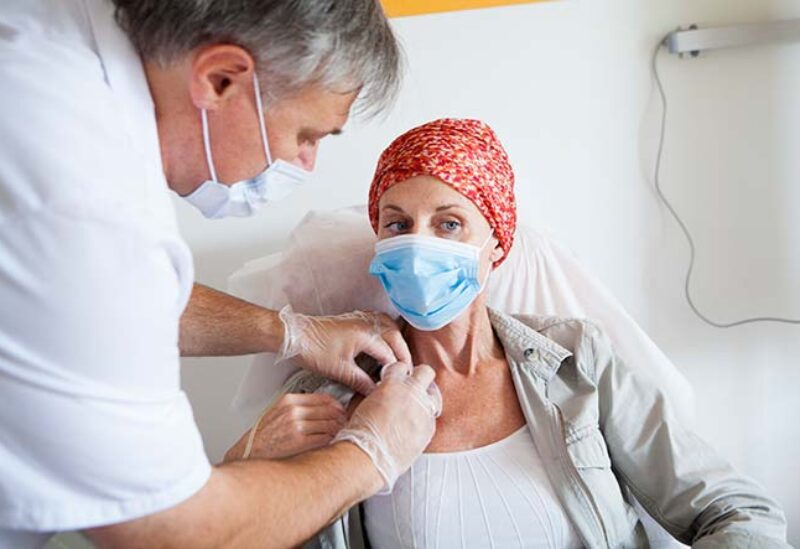
When doctors at a hospital in Cornwall carried out a follow-up check last summer on a 61-year-old man recently diagnosed with cancer, they found something extraordinary, the MailOnline said, noting that the tumors, which scans just a few weeks earlier revealed were littering his torso, had almost disappeared.
The patient, who was unnamed but was featured in a paper in the British Journal of Haematology, had not yet started chemotherapy for the disease, called Hodgkin lymphoma — a type of blood cancer that affects nearly 2,100 people yearly in the United Kingdom.
So the sudden disappearance of the cancerous cells that had riddled his body was a total mystery.
Spontaneous remission of this type of cancer does occur but it’s incredibly rare; only a couple of dozen cases, from all over the world, have ever been recorded.
But there was one potential — albeit quite incredible — explanation for his cancer’s disappearance act. Just a few days after receiving his diagnosis, the patient was hospitalized with severe coronavirus infection.
After testing positive for the virus, he developed pneumonia, inflammation of the lungs caused by the viral infection.
He was put on oxygen to help him breathe while his lungs recuperated, and kept in hospital for eleven days, before being discharged home, fully recovered.
It was a few weeks later that a CT scan to check his cancer revealed it had all but gone.
The conclusion his doctors reached was extraordinary; COVID-19 had destroyed his cancer by firing up his immune system enough not just to see off the virus but to attack and destroy malignant cells, too.
“We think COVID-19 triggered an anti-tumor immune response,” Dr Sarah Challoner, one of the doctors treating the cancer at the Royal Cornwall Hospital in Truro, said in the published report.
Challoner believes that infection-fighting cells, called T-cells, released on a large scale by the immune system to try to see off the virus also attacked cancer cells which it recognized as “foreign”.
Hodgkin lymphoma is a type of blood cancer that develops when white blood cells, called lymphocytes, grow out of control, spilling out of the bone marrow (where white blood cells form) then spreading to the lymph nodes, a network of hundreds of tiny, bean-shaped structures round the body.
Lymph nodes allow a watery fluid, called lymph, to circulate around the body, draining waste products and delivering nutrients to cells. One of the first signs of the disease is painful swelling in lymph nodes in the neck, armpits or groin, as the cancerous white blood cells congregate.
It usually responds well to chemotherapy, the main treatment, and nearly 90% of patients are still alive five years after diagnosis. But this patient had yet to start treatment; the only change to his circumstances was to have the coronavirus.
The idea that one of the most dangerous viruses the world has ever seen might save some lives — not claim them — seems nonsensical. But the Cornish example is not the only one — although experts have been quick to urge caution among cancer patients.
“The message for anyone with cancer is that, deliberately exposing yourself to COVID-19 in the hope it will heal you is much more likely to lead to your untimely demise than to a cure,” warns Paul Hunter, a professor of medicine at the University of East Anglia.
But the reports are remarkable. Last August, for instance, in the journal Acta Biomedica, doctors at Cremona Hospital in Italy, reported the case of a 20-year-old man with non-Hodgkin lymphoma, a more common type of blood cancer that affects 13,000 people in Britain every year.
Despite treatments, the patient’s cancer had relapsed many times and appeared unresponsive to chemotherapy or radiotherapy. But after testing positive for the coronavirus early in the spring of 2020, when the outbreak in Italy was at its height, he suffered 5 days of exhaustion, cough and fever as his body tried to fight off the virus. A few weeks later, as with the man in Cornwall, scans showed the cancer had vanished.
“COVID-19 infection might have played a crucial role in his remission,” doctors said.
A third case, this time at the Humanitas Research Hospital in Milan, Italy, was reported in February in the European Journal of Nuclear Medicine and Molecular Imaging. All signs of lymphoma quickly vanished in a 61-year-old man who contracted the coronavirus.